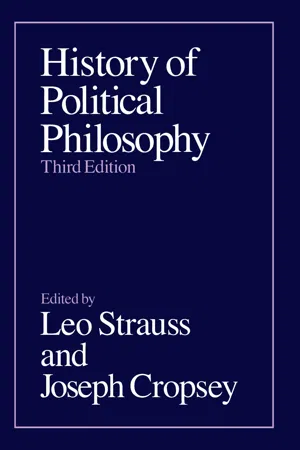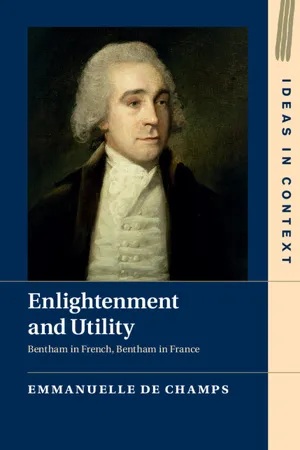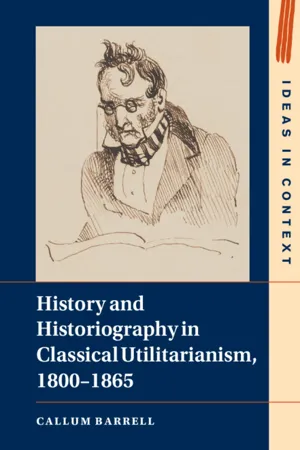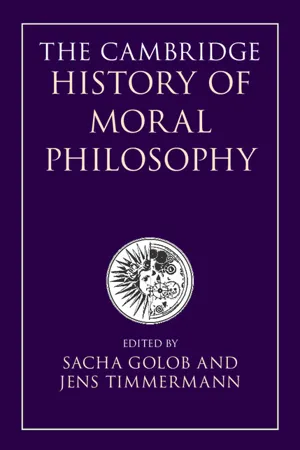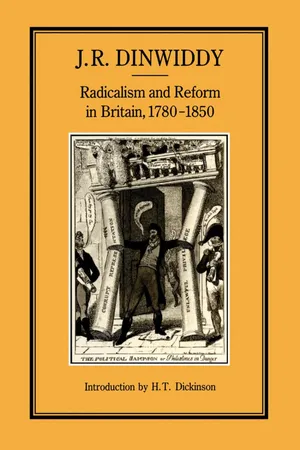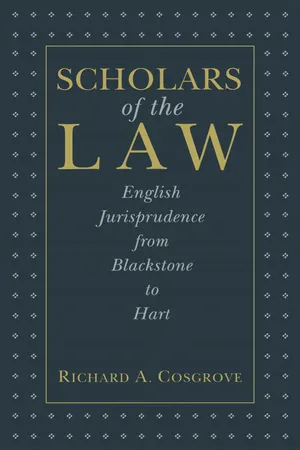History
Jeremy Bentham
Jeremy Bentham was an influential English philosopher and social reformer in the 18th and 19th centuries. He is best known for his development of utilitarianism, a moral theory that advocates for actions that maximize overall happiness and minimize suffering. Bentham's ideas had a significant impact on political and legal reform, and his work continues to be influential in the fields of ethics and political philosophy.
Written by Perlego with AI-assistance
Related key terms
1 of 5
11 Key excerpts on "Jeremy Bentham"
- eBook - PDF
Classical Theorists in the Social Scienc
From Western Ideas to African Realities
- Dejo Abdulrahman(Author)
- 2023(Publication Date)
- Malthouse Press(Publisher)
12 Political Thought of Jeremy Bentham, 1748-1852 S. M. Omodia & Olawole C. Oluwasuji Jeremy Bentham: Life and Time Jeremy Bentham was an English philosopher, jurist, and social reformer. He is regarded as the founder of modern utilitarianism. He was born in London, England on 15 February 1748 and died on 6 June 1832 at age of 84 in London, England. He belonged to the school of utilitarian, legal positivism and liberalism. His notable idea was on “Greater happiness principle”. He became a leading theorist in Anglo-American philosophy of law, and a political radical whose ideas influenced the development of welfarism. He advocated individual and economic freedom, the separation of the church from the state, freedom of expression, equal rights for women, the right to divorce and the decriminalism of homosexual acts. He was influenced by the work of Protagoras, Epicurus, John Locke, David Hume, Montesquieu, Helvetius, Thomas Hobbes, Beccaria and Adam Smith. He later influenced scholars such as John Stuart Mill, Henry Sedgwick, Michael Foucault, Peter Singer, John Austin, Robert Owen, H.L.A Hart and Francis Edgeworth. Generally, he was born into a wealthy middle-class family. He lost his mother at the age of 10. His father was very strict and demanding who ensured a thorough education for his son. Bentham started to learn Latin at the age of three and went to Queen’s College, Oxford at the age of 12. He had one surviving brother, Samuel Bentham, with whom he was very close. Bentham studied law and was called to bar in 1769. He never pleaded a single case and gave up the idea of practicing law out of conviction that the whole system of law needed reform. His beloved phrase “the greatest happiness of the greatest number” was as a result of the influence he got from the work of Beccaria’s “Essays on Crime and Punishment (1764). - eBook - ePub
- Leo Strauss, Joseph Cropsey, Leo Strauss, Joseph Cropsey(Authors)
- 2012(Publication Date)
- University of Chicago Press(Publisher)
Jeremy Bentham 1748–1832 JAMES MILL 1773–1836 Jeremy Bentham may be variously described as a political and legal philosopher, a social reformer, the founder of utilitarianism, and a philosophe. “Utilitarianism” indicates the view that whether an act is right or wrong depends on whether one believes its consequences to be good or bad. For Bentham, “good” and “bad” refer to pleasures or pains produced in the experiences of individual human beings. “Philosophe” refers to a category of European intellectuals of the eighteenth century, among whom Bentham enjoyed much more immediate success than in his native England. Like the philosophes, Bentham believed that the human condition must inevitably improve through the sheer proliferation of knowledge in the sense of encyclopedic information, coupled with abstract principles for classifying the information and putting it to work in reforming society. 1 Bentham distrusted inherited experience and features of political order defended by appeal to traditional acceptance. Reliance on past practice was, to him, a sign of ignorance. In this view, ignorance, to Bentham, was a problem with a solution. The antidote to ignorance was to become well informed. Not surprisingly, then, Bentham rejected with scorn the notion of Socratic ignorance. The latter points to the mysterious difficulty of reaching any fixed, final understanding of the fundamental questions of how we ought to live. According to Plato’s Socrates, questions of right and wrong, good and bad, the beautiful and the ugly, must apparently ever be in dispute in political life (Euthyphro, 7 d). The beginning of wisdom would be always to keep in mind this sobering and limiting condition in our arguments with each other. The follower of Socrates may question the received opinions of society but not necessarily to overthrow them, since it is always possible that those opinions may be discovered to be worthy of support - eBook - ePub
Political Thought in the Age of Revolution 1776-1848
Burke to Marx
- Michael Levin(Author)
- 2010(Publication Date)
- Bloomsbury Academic(Publisher)
9In accord with his will, Bentham is now in a glass box at University College, University of London, where he looks remarkably well for a man of his age. This is not so difficult as he has been given a wax head, the real one being kept in a fridge. Nearby, a pub has been named in his honour, the ‘Jeremy Bentham’. It is, appropriately, dedicated to ‘the greatest happiness of the greatest number’.Early Writings
In a work of 1725, Frances Hutcheson wrote that ‘that action is best, which procures the greatest happiness for the greatest number; and that, worst, which, in like manner, occasions misery’.10 Here, we have the core of utilitarianism, traces of which can also be found in such other eighteenth-century writers as Lord Shaftesbury, David Hume, Claud Helvétius, Adam Smith, William Paley, Joseph Priestley and William Godwin. It was Jeremy Bentham, however, who attempted to construct a full utilitarian system and with whom the doctrine is most fully associated.Many of Bentham’s writings relate to the reform of the law and the pursuit of rational constitutionalism. This, he realised, was an immense task, for ‘the English law is a great part of it of such a nature, as to be bad every where.’11 ‘Were there no architects who could distinguish a dwelling-house from a barn, or a side-wall from a ceiling, what would architects be? They would be what all legislators are at present.’12 As a student at Oxford, Bentham had attended the lectures of Sir William Blackstone, the leading legal authority of the day. These were published as Commentaries on the Laws of England (1765–9). Bentham’s A Fragment on Government , published anonymously in 1776, was a vehement attack on his former teacher for his ‘antipathy to reformation’. Already on the second page of the Preface, Blackstone was denounced as ‘a determined and persevering enemy’ of all those trying to become ‘better acquainted with the chief means of living happily in’ their own country.13 The modestly described Fragment was the first major work of English utilitarianism. In it, Bentham declared that every law and institution should be judged according to its utility and swept away if it failed the test. In his opinion, there was nothing to worry about in the free censure of institutions for ‘a system that is never to be censured, will never be improved.’14 - eBook - PDF
Enlightenment and Utility
Bentham in French, Bentham in France
- Emmanuelle de Champs(Author)
- 2015(Publication Date)
- Cambridge University Press(Publisher)
The first is presenting the philosopher’s ideas as an isolated system, abstracted from the historical conditions in which they were put to paper. In Bentham’s case, this approach is all the more tempting in that there is undoubtedly a systematic and self-referring element in his writings. The second pitfall is segmenting the study of his thought chronologically. Often, the younger Bentham – the writer of A Fragment on Government and An Introduction to the Principles of Morals and Legislation in the 1770s and 1780s – is studied independently from the older one – the English radical and the Liberal codifier for Greece, Spain, Portugal and Latin America. By placing Bentham’s thought in a European context, this book throws light on continuities rather than divisions. Like other recent pieces of scholarship, the re-contextualisation of the historical figure of Jeremy Bentham proposed here relies on the uncov- ering of a significant body of manuscripts, in this case the early French manuscripts and unpublished correspondence. It is also indebted to the careful editorial work conducted at the Bentham Project, University College London, in the preparation of The Collected Works of Jeremy Ben- tham. While making previously unknown material available, the editors also provide thorough information on the writing and editorial history of each text, which is indeed a prerequisite for any contextual study. In Utility and Democracy: The Political Thought of Jeremy Bentham, Philip Schofield has demonstrated how a thorough familiarity with both published and unpublished sources makes a historical study of the development of Ben- tham’s utilitarianism not merely possible, but necessary. 4 ∗ Covering Bentham’s formative years, Part I studies the Enlightenment roots of his career as a philosopher. A precocious child, he was educated first at Westminster School and, from the age of 12, at Queen’s College, Oxford. - eBook - PDF
- Wayne P. Pomerleau(Author)
- 2022(Publication Date)
- Wiley-Blackwell(Publisher)
224 Modern European Philosophers, First Edition. Wayne P. Pomerleau. © 2023 John Wiley & Sons, Inc. Published 2023 by John Wiley & Sons, Inc. 14 Source: C. Fox, 1838, after H. W. Pickersgill./Wellcome Collection/Public Domain 14.1 Overview Before we turn to the two most important German idealists following Kant, we shall now consider a thinker who represents a striking alternative. In the distinguished line of British empiricists, Jeremy Bentham was the most significant one between Hume and Mill; as he was significantly influenced by the former, so he significantly influenced the latter. He was among the most practical Jeremy Bentham -14. Biography 225 philosophers we are studying here, being little interested in abstract thought for its own sake. Though he is best known as the founder of the utilitarian movement, there is more to his philoso- phy than that would suggest. 14.2 Biography Jeremy Bentham was born on February 15, 1748, in Houndsditch, London. His father, Jeremiah Bentham, was a wealthy lawyer who intended that he also become a lawyer and, perhaps, move into a successful political career. The boy was a prodigy, allegedly reading English history while still a toddler, studying Latin at the age of three, learning to play a violin, attending the Westminster school at the age of seven, and then being sent to Queen’s College, Oxford, in 1760. There, at the age of 12, he was required to sign the Thirty-nine Articles of faith for the Church of England, 1 despite his hesitant doubts about doing so (Works, x, 37). After graduating in 1763, he started studying law, before taking a Master’s degree in 1766. However, despite his father’s wishes, he chose the life of a writer, dedicated to reforming the law, rather than actively practicing law or seeking political office. He had heard lectures by the famous William Blackstone and been unim- pressed by their uncritical allegiance to the status quo. - eBook - ePub
Loyal Dissent
Brief Lives of Westminster School
- Patrick Derham, Ian Donaldson, A. C. Grayling, James Campbell, Peter Cox, Nick Clegg(Authors)
- 2016(Publication Date)
- University of Buckingham Press(Publisher)
As a thorough Utilitarian it was inevitable that Bentham should wish his corpse to be useful after his death. He provided in his will that his body should be publicly dissected to illustrate the value of donating one’s body to medical science. His funeral eulogy was delivered over his dissected remains by the physician Thomas Southwood Smith. Bentham also directed that his body should become an “auto-icon,” dressed in his habitual clothes and put on display to serve an educational purpose for the public. Accordingly he sits, thus clothed, in speculative mood in a glass cabinet in University College London, and can be visited there to this day.Bentham’s influence on thinkers and societies other than his own has already been indicated. It began to be more apparent in his home terrain when John Stuart Mill in effect reintroduced his countrymen to Bentham’s thought, first by editing and publishing the five volumes of the Rationale of Judicial Evidence (1838-43) and then by developing the utilitarian doctrine that he had inherited from him. Mill was no mere disciple, though, as his father had largely been; he recognized that there could be an argument to the effect that pleasures are not all equal, but can come in higher and lower forms, and he recognized that minorities needed protection from the possible tyranny of majorities, which means that democracy has to be tempered by constitutional restraints and protections for individual liberty, which he valued as an intrinsic good.But once Benthamite themes started to gain a wider audience in the decades after his death, their influence grew too. This was especially noticeable in economic theory, where the utilitarian calculus Bentham had sought to devise (the “felicific calculus” intended as a practical metric for deciding what would maximize the utilities in a given case) influenced the development of cost-benefit analysis. While starting from the same premise as Adam Smith, that the pursuit of their own interests by individuals would aggregate to the overall prosperity of the country, and agreeing therefore that the legislative burden on economic activity should be light, Bentham nevertheless saw that there would be a need for government to deal with the unequal distribution of benefits that would result from diminishing marginal utility. This inspired later economists such as W. S. Jevons and Sydney Webb to develop welfare economics, though theorists on the other side of the political spectrum were also able to mine Bentham for ideas about individualism and even libertarianism. That this is so is a characteristic mark of the work of anyone as wide-ranging and multiple as Bentham; perhaps one should say that he cannot be held wholly responsible for what others made of his ideas. - Callum Barrell(Author)
- 2021(Publication Date)
- Cambridge University Press(Publisher)
173 Marx’s strident reproof in Das Kapital was arguably the most memorable, but the immediate damage was dealt by moderate and philosophic Whigs in the early decades of the nineteenth century. 174 Jeffrey’s complaint in 1804 of Bentham’s ‘vulgar’ distinctions between right and wrong set the tone for other Whigs who rejected utilitarian morality and logic. Bentham did believe that, over time, these historical differences would become increasingly less significant; and it is also true that he assigned to his ‘universal system of human actions’ an essentially timeless significance. The principle of self-preservation, he argued, was embedded in human nature and civil society, a fact which he, like Hobbes and Locke, could only establish hypothetically. On this basis E. J. Eisenach has argued that, according to Bentham, ‘law should be based on the universal motives of and desire for the means of self-preservation’, and that in future these historical differences would dissolve into a ‘timeless and universal science of politics’ in which we are bound by ‘self-interest and the fear of death’. 175 In a more immediate context, however, the legislator’s task was to weigh up the utility of abandoning established laws and customs, and while it would be an overstatement to argue that for Bentham the relationship between human nature and history was meaningfully co-constitutive, he denied that our conceptions of pleasure and pain were universal, beyond very basic aversions such as the fear of death. As Simon Evnine has shown in the case of David Hume, it is important to distinguish between substan- tive and methodological uniformity; the former implies that individuals always pursue what they think is good, whereas the latter implies that notions of the good change according to time and place. 176 This distinction 173 J. Bentham (ed. P. Schofield ), Of the limits of the penal branch of jurisprudence [1780–1782] (Oxford: Oxford University Press, 2010), p.- eBook - PDF
- Sacha Golob, Jens Timmermann(Authors)
- 2017(Publication Date)
- Cambridge University Press(Publisher)
We began by noting that both Smith and Bentham have a somewhat uneasy place in the canon of moral philosophy, but they are becoming increasingly influential in the link between public policy and philosophy. Bentham’s utilitarianism is enjoying something of a revival via the impact on public policy of the ‘happiness studies’ of Layard and others. 25 Smith, on the other hand, is slowly being restored to his place in the history of philosophy by the increasing interest in moral psychology and by the interest in his concept of the impartial spectator seen in the work of Stephen Darwall, Gilbert Harman and Amartya Sen. Both Smith and Bentham deserve to be taken more seriously by philosophers. 24 Bentham 1948b: 143. 25 Layard 2005. Smith and Bentham 363 BIBLIOGRAPHY An asterisk denotes secondary literature especially suitable for further reading. Bentham, J. 1948a. ‘Fragment on Government’, in W. Harrison (ed.), A Fragment on Government and An Introduction to the Principles of Morals and Legislation, Oxford, Basil Blackwell, pp. 1–112. Bentham, J. 1948b. ‘An Introduction to the Principles of Morals and Legislation’, in W. Harrison (ed.), A Fragment on Government and An Introduction to the Principles of Morals and Legislation, Oxford, Basil Blackwell, pp. 113–435. Bentham, J. 1952–3. ‘Defence of Usury’, in W. Stark (ed.), Jeremy Bentham’s Economic Writings, 3 vols. London, George Allen & Unwin, vol. 1. Bentham, J. 2001. ‘Anarchical Fallacies’, in R. Harrison (ed.), Bentham: Selected Writings on Utilitarianism, Ware, Wordsworth Editions, pp. 381–459. Campbell, T.D. and Ross, I.S. 1981. ‘The Utilitarianism of Adam Smith’s Policy Advice’, Journal of the History of Ideas, 42.1, 73–92. Forman Barzilai, F. 2010. Adam Smith and the Circles of Sympathy: Cosmopolitanism and Moral Theory, Cambridge University Press. Hume, D. 1976. A Treatise of Human Nature, L.A. Selby-Bigge (ed.), P.H. Nidditch (rev.), Oxford, Clarendon Press. Hutcheson, F. - eBook - PDF
- J. R. Dinwiddy(Author)
- 1992(Publication Date)
- Hambledon Continuum(Publisher)
17 Bentham on Private Ethics and the Principle of Utility At present, any discussion of Bentham's ideas about ethics must take account of the reinterpretation of the subject offered by David Lyons in the first hundred pages or so of his book In the Interest of the Governed : A Study of Bentham 's Philosophy of Utility and Law 0). This work, which has cast doubts on many of the received assumptions about this important area of Bentham's thought, has been called 'a major new interpretation 1 , and k an essential book for students of historical utilitarianism' ( 2 ). Most of Lyons' argument is based on a close analysis of certain parts of An Introduction to the Principles of Morals and Legislation ( 3 ) (particularly the early paragraphs of chapter I and the first twenty paragraphs of chapter XVII), though he does refer from time to time to other writings of Bentham's. He maintains that his concentration on An Introduction to the Principles is justified by the fact that it contains the most systematic and celebrated exposition of Bentham's ideas. The main points of Lyons' interpretation can, with the aid of his own summary on pp. 18-20 of his book, be sketched as follows. First, Bentham assumed that interests naturally harmonized. Secondly, he did not embrace psychological egoism ; his view of man as motivated by desire for pleasure and aversion to pain did not have egoistic implications, and for most of his life he did not even think that selfishness was predominant in human motivation. The third and most (1) Oxford, 1973. (2) J. BRENTON STEARNS, 'Bentham on Public and Private Ethics', Canadian Journal of Philosophy , v (1975), 583 ; Jan NARVESON, review in Philosophical Review, Ixxiv (1975), 425. (3) First printed in 1780, and published in 1789 ; edited, for The Collected Works of Jeremy Bentham, by J. H. Burns and H. L. A. Hart (London, 1970). Referred to in subsequent footnotes as IPML, followed by chapter and paragraph numbers. - eBook - PDF
Scholars of the Law
English Jurisprudence From Blackstone to Hart
- Richard A. Cosgrove(Author)
- 1996(Publication Date)
- NYU Press(Publisher)
Bentham wrot e copiousl y throughou t hi s life , ye t mos t o f what h e produce d remaine d unpublished . Fo r a n individ -ual wh o sough t a rol e i n th e formulatio n o f publi c policy , Bentham ha d th e unhapp y habi t o f flitting fro m topi c t o topic, neve r quit e finishing hi s intellectua l projects . T o this da y a veritabl e Bentha m industr y ha s continue d t o make ne w discoverie s amon g th e manuscript s a t th e Uni -versity o f London . T h e increase d emphasi s o n an d prais e fo r Bentham' s work a s a juris t stand s i n contras t t o th e statu s o f hi s reputation amon g historians . A s Marti n Weine r ha s sug -gested pertinently , i t ha s becom e a curiou s situatio n tha t Bentham's wor k ha s draw n increasin g criticis m fro m his -torians, particularl y i n th e wa y tha t Bentham' s scheme s constituted a n expansio n o f stat e control. 6 T h e recen t explication, indee d justification, o f Bentham' s Panoptico n scheme b y Janet Semple , whe n du e regar d i s grante d fo r the socia l an d politica l assumption s o f a pas t age , stil l strikes th e reade r a s a scar y experimen t i n socia l engi -neering. 7 Bentha m value d benevolen t governmen t i n most case s mor e highl y tha n liberty , an d s o hi s nam e became linke d t o th e growt h o f governmen t i n th e nine -teenth century . I f historian s hav e faile d t o appreciat e th e fundamental natur e o f Bentham' s contributio n t o moder n English jurisprudence, i t is also th e cas e tha t lega l philoso -phers hav e pondere d Bentham' s wor k wit h scan t regar d for historica l context , an d hav e writte n abou t hi s wor k a s if i t were devoi d o f socia l o r politica l consequences . From a historica l perspective , on e migh t questio n th e The Light of Utility 55 influence o f Bentha m whe n man y o f hi s idea s neve r wer e exposed t o publi c scrutiny . - eBook - PDF
Moral and Political Philosophy
Key Issues, Concepts and Theories
- Paul Smith(Author)
- 2008(Publication Date)
- Palgrave Macmillan(Publisher)
First, it defines the good independently of the right, that is, non-morally. It defines the good as utility, that is, pleasure, happiness or satisfaction of wants or interests. It then defines the right as whichever actions or rules would maximize utility for all affected. Thus in utilitarianism the good is prior to, and determines, the right.l 144 Moral and Political Philowphy This chapter summarizes the classical utilitarianism of Jeremy Bentham and John Stuart Mill, explains the varieties of contempo- rary utilitarianism, identifies many attractions of utilitarianism, considers its implications for liberty, rights, equality and social justice, and discusses objections to utilitarianism and utilitarian replies. Bentham's and Mill's utilitarianism Jeremy Bentham (1748-1832) and John Stuart Mill (1806-73), the main founders of utilitarianism, illustrate the elements and structure of the theory identified above. Bentham 2 claimed that humans are naturally governed by pain and pleasure. These alone determine 'all we do', say and think. And these alone indicate 'what we ought to do, ... the standard of right and wrong'. Bentham's questionable factual claim that our own happiness determines what we do and his moral claim that everyone's happi- ness determines what we ought to do, are in tension. If the factual claim were true, it would make utilitarian morality dependent on reward and punishment to align moral conduct with pursuit of one's own happiness. However, it is the moral claim we are concerned with, so we can set aside the factual claim. Utility, Bentham says, means producing 'benefit, advantage, pleasure, good or happiness' or preventing 'mischief, pain, evil or unhappiness'. The value of a pleasure or pain depends on its intensity, duration and probability. It might be objected, Bentham notes, that pleasure is not the only value - the arts and sciences, for example, are valuable too.
Index pages curate the most relevant extracts from our library of academic textbooks. They’ve been created using an in-house natural language model (NLM), each adding context and meaning to key research topics.

